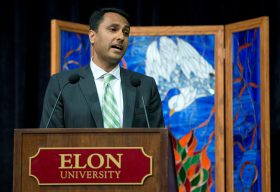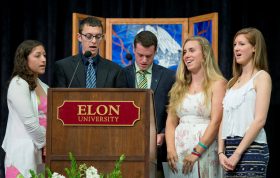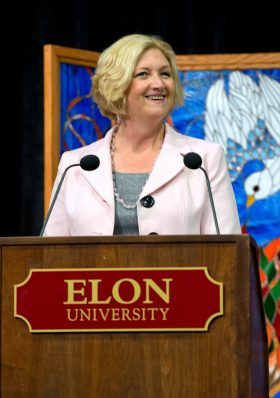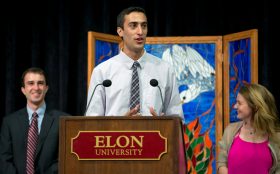In his May 23 Baccalaureate address, the founder and president of Interfaith Youth Core urged the graduating class to make the most of their liberal arts education.

Using a simple story about a fight he witnessed in high school, Eboo Patel, founder and president of the Interfaith Youth Core, explained that his actions—standing up with his peers to watch and cheer on a fight between two students—was against what he believed but cool in that moment.
It also was a mistake, said Patel in the message he delivered during Elon’s Baccalaureate service in Alumni Gym Friday afternoon. The university holds the multi-faith service each year in honor of the graduating class, their families and the Elon Community.
Patel weaved the story from his past and similar lessons he gleaned from “Almost Famous,” a movie about a high school boy who writes about an up-and-coming rock band, into his speech “To Be Uncool.”
An author, journalist, scholar and American Muslim of Indian heritage, Patel is the visionary behind IFYC, the Chicago-based organization building an interfaith movement on college campuses. He has spoken at TED conferences, the Clinton Global Initiative and the Nobel Peace Prize Forum, as well as on many college and university campuses across the country, including Elon.
Patel was one of six spiritual leaders at Elon’s 2013 Spring Convocation focused on finding common ground in a diverse world. He also was among the distinguished panelists who took part in the university’s 2011 Spring Convocation about the challenges facing society.

“Small as it might seem, I couldn’t get the matter out of my head,” Patel said. “Why had J.J. stayed seated while I stood up?”
It’s a question he’s considered carefully. “All of that energy pretending to care about things that didn’t really matter to me rather than cultivating my own sense of calling,” he said.
For Patel, that’s the value of universities such as Elon, a place where the liberal arts are taken seriously, even if they seem uncool. “The liberal arts require you to author your own moral core,” he said

Illustrating his point, Patel spoke a lot about the lessons Lester Bangs, a legendary rock journalist, attempts to impart on William Miller, the main character in “Almost Famous.”
Bangs gives young Miller some advice: keep your distance from the band and the parties and the pretty girls. Be honest and unmerciful about the music. Stay uncool,” Patel said. And when Miller violates the code and confesses to Bangs, his mentor tells him: “The only true currency in this bankrupt world is what you share with someone else when you’re uncool.”
At the close of his message, Patel said he wished for the graduates the fruits of a liberal arts education: “Your own garden and the tools to tend it, the strength to be honest and unmerciful and a community who shares with you the true currency of uncoolness.”
Before Patel spoke, University Chaplain Jan Fuller remembered Michelle Pfleger and Jordan West, two students from the Class of 2014 who died during their time at Elon. She reminded the graduates, who were seated before her surrounded by family and friends, to make Pfleger and West proud as they go forward and to be thankful to the people who helped them get to this point.
“We are mindful today of the families and friends who have sustained you through the years,” Fuller said. “We honor also the faculty and staff who have been your mentors, who have invited you to embrace your education as a commitment to lifelong learning.”

“I realized that one person could ruin an entire reputation of a culture and a religion, but also another person can be a great example of a religion and culture,” she said. “And I took that responsibility with great pride.”
Bruno said he spent his time at Elon wisely. “I have stayed true to myself by going to Mass on Sunday and calling my parents every weekend,” he said. “I went out of my comfort zone and took part in events like Numen Lumen and the Holi festival.”
Honan said he had extraordinary mentors but also struggled to find his place at Elon. Even so, he wouldn’t trade the experience.
“We hate and we love things in life we feel most passionately about, and sometimes we even hate and love life itself,” Honan said. “I hate and love Elon. And secretly, I love that I do this.”


